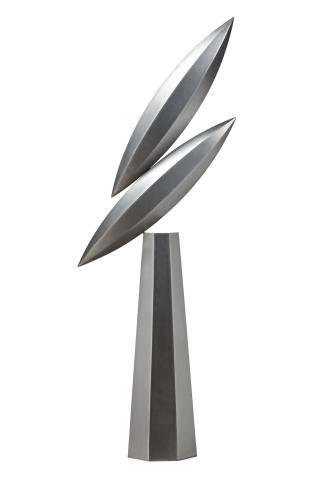UNTITLED, 1999
AKIO MAKIGAWA
stainless steel
117.5 cm height
signed, dated and numbered at base: AKIO1999 4/6
Bonhams & Goodman, Melbourne, 24 November 2009, lot 49
Private collection, Melbourne
Akio Makigawa, Sherman Gallery Hargrave, Sydney, February – March 1999
Cooper, J., Akio Makigawa, Macmillan Art Publishing, 2014, cat. 150, pp. 469 (illus, preparatory sketch), 496 – 497 (illus., another example), 534 (illus., fig. 150, another example), 561 (illus., another example)
‘As objects, works of art and sculptures, Akio Makigawa’s works have an exquisite symmetry, an assured presence and above all a sublime instinct for the opportunities of material, a quality that is very much in his cultural inheritance.’1
Untitled, 1999 is a captured moment of suspense. Makigawa presents two seed-shaped vessels on the brink of its octagonal base. He purposely rests their sharper side on top of each other instead of being perfectly nestled on their seemingly balanced base. Despite the uncertainty in their placement, Makigawa cleverly presents Untitled, 1999 with flawless balance and a quiet elegance. He alludes a meditative calmness and poise in his figures but its construction required activity and energy as the figures teeter on a single point.2
From 1998 to 1999, Makigawa produced smaller scale sculptures motivated by the theme ‘Beginning’, expressing ideas of life, growth and spirituality. ‘Beginning’, comprising of figures of seeds, bowls, and houses, was Makigawa’s final series of works before his passing in December 1999. Widely known throughout his artistic career for his large scale corporate and public commissioned sculptures, Makigawa took an intimate turn in his solo exhibition crafting universal and personal symbols that would evoke reflection and spirituality. Nine Lives exhibited at Anna Schwartz Gallery in Melbourne encapsulated the peaceful elegance of his brushed steel works featuring life symbols including half-seed pods. The figures spread throughout the gallery floor is described as the ‘most elegant and powerful exhibition ... stripped to a formal essence [like] sculptural haikus.’3
Makigawa’s seed figure was first developed in his oeuvre in the 1980s and has proven to be a signature symbol in his final designs. The treatment of materials plays an important role in Makigawa’s expressions as he uses them to provide a symbolic and yet practical purpose. He has explained that stainless steel represents ‘durability and also expresses a duality of organic and man-made beginnings,’4 The hollow formation of the stainless steel seed further evokes the figure as a vessel of new life and protection.
1. Capon, E., ‘Foreword’ in Cooper, J., Akio Makigawa, Macmillan Art Publishing, Melbourne, 2013, p. 104
2. Cooper, J., Akio Makigawa, Macmillan Art Publishing, Melbourne, 2013, p. 534
3. Cooper, J., quoted in Rollo, J., ‘Book pays tribute to sculptor of rare talent’, Sydney Morning Herald, Sydney, 4 September 2014
4. Cooper, J., Akio Makigawa, Macmillan Art Publishing, Melbourne, 2013, p.494
MARA SISON
